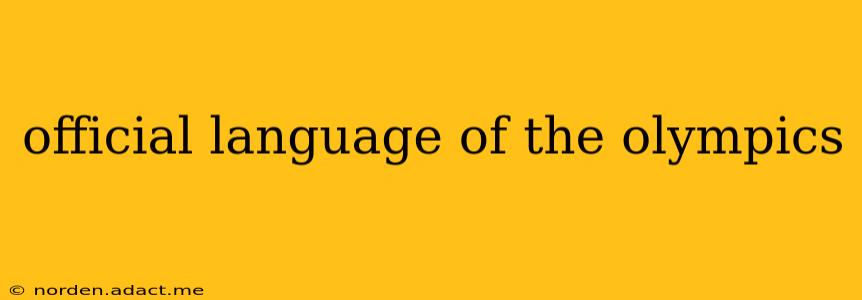The Olympic Games, a global spectacle uniting athletes and spectators from across the world, don't rely on a single official language. Instead, a multifaceted approach to communication ensures inclusivity and smooth operation. While there isn't one definitive "official language," English and French hold prominent positions, playing crucial roles in the organization and communication of the Games. Understanding this nuanced system is key to appreciating the complexities of running such a massive international event.
What Languages Are Used at the Olympics?
The International Olympic Committee (IOC) officially uses both English and French as its working languages. This means all official documents, communications, and meetings are conducted in, or translated into, these two languages. This dual-language approach reflects the historical significance of both languages within the Olympic movement and strives for global representation.
However, the reality on the ground is far more diverse. The host country's language(s) also play a significant role, particularly in local communications, signage, and volunteer interactions. Furthermore, numerous other languages are spoken amongst the athletes, officials, and spectators, creating a vibrant multilingual environment. The IOC works to facilitate communication through translation services and multilingual materials.
Is English the Main Language of the Olympics?
While not explicitly stated as the main language, English functions as the dominant language in many aspects of the Olympic Games. Its widespread global usage makes it a practical choice for international communication. Many official announcements, press releases, and media coverage are predominantly in English. This makes it essential for anyone involved in or following the Olympics to have at least a basic understanding of the language.
What Are the Working Languages of the IOC?
As mentioned previously, the working languages of the IOC are English and French. This is enshrined in the IOC's Charter and reflects the historical development of the organization. This dual-language system aims to ensure inclusivity and equal representation, promoting clear communication among members and stakeholders from diverse linguistic backgrounds.
Why Are Both English and French Used?
The choice of both English and French stems from the history of the modern Olympic movement. The IOC was founded in 1894, and French, at that time, held significant international prominence. The continued use of French alongside the ever-increasing global dominance of English aims to strike a balance between historical respect and practical global communication.
How Does the Olympics Manage Communication with So Many Languages?
Managing communication across numerous languages is a significant logistical undertaking. The IOC employs a sophisticated system including:
- Translation services: Professional translators are vital in ensuring that official documents, announcements, and communications are accurately conveyed in multiple languages.
- Multilingual signage: Wayfinding and informational signage at Olympic venues are often displayed in multiple languages, aiding navigation and comprehension for participants and spectators.
- Interpretation services: Live interpretation is often provided during official ceremonies, press conferences, and meetings to facilitate communication between individuals speaking different languages.
- Digital platforms: The use of digital platforms with multilingual capabilities enhances communication and access to information for a global audience.
In conclusion, while English and French officially serve as the working languages of the IOC, the Olympics are undeniably a multilingual event. The successful operation of the Games relies on a multifaceted communication strategy incorporating the host country's language(s) and various translation and interpretation services to ensure inclusivity and effective communication for all involved.
